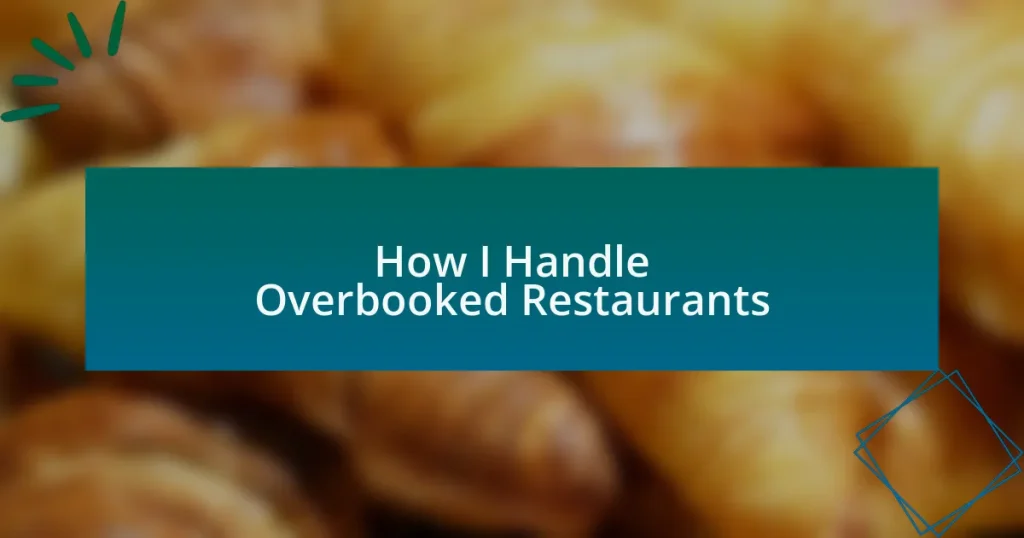Key takeaways:
- Overbooking in restaurants can lead to poor service and guest frustration; managing reservations effectively is crucial for operational efficiency.
- Transparent communication and offering alternatives can significantly improve guest experiences during overbooked situations.
- Creating engaging moments, like offering complimentary drinks or special experiences, can turn potential disappointments into memorable dining occasions.
- Teamwork and openness during peak times can enhance service quality and foster a positive atmosphere for both staff and guests.
Author: Evelyn Harrington
Bio: Evelyn Harrington is an acclaimed author known for her evocative storytelling and intricate character development. With a background in literature and creative writing, she has published several best-selling novels that explore themes of resilience and identity. Her work has garnered numerous awards, including the prestigious Waverly Prize for Fiction. When she’s not writing, Evelyn enjoys hiking the scenic trails of her hometown and engaging with her readers through her popular blog. She currently resides in Portland, Oregon, where she continues to craft compelling narratives that resonate with audiences worldwide.
Understanding overbooked restaurants
When I think about overbooked restaurants, I can’t help but remember a particular Saturday night when my patience was truly tested. I arrived eager for a tasty meal, only to face a bustling crowd and a long wait. Have you ever felt that gnawing frustration, wondering why restaurants accept more reservations than they can handle?
Overbooking can stem from various reasons, such as to compensate for no-shows or to maximize table revenue during peak times. However, as a customer, it’s disheartening to stand by and watch the chaos unfold. The restaurant’s intent often gets overshadowed by the overwhelmed staff struggling to keep things afloat.
There’s a fine line between busy and chaotic, and I’ve seen how overbooked environments can sour the dining experience. For instance, have you noticed that when a restaurant is too packed, the service often suffers? I remember a time when orders were mixed up, and I couldn’t help but think—wouldn’t it be better to have fewer guests enjoying their meal than to stretch staff thin and potentially tarnish the restaurant’s reputation?
Importance of managing reservations
When it comes to managing reservations, I’ve learned firsthand just how crucial it is for a smooth dining experience. I recall a cozy dinner I had recently, where I noticed the seamless flow of service despite the busy night. The restaurant had clearly anticipated their capacity and kept reservations in check. This not only ensured everyone received their meals on time but also added a warm atmosphere where guests could relax and enjoy their evening.
A well-managed reservation system can be the lifeblood of a restaurant, helping to balance customer satisfaction and operational efficiency. I remember visiting a bistro where the host used an app that tracked reservations and walk-ins meticulously. This made it easy for the staff to gauge how many more tables they could accommodate without sacrificing service quality. It’s fascinating how technology can improve the dining experience while preventing unnecessary chaos.
Moreover, consistent reservation management can significantly boost a restaurant’s reputation. I think back to another night when a friend and I decided to try a popular spot, only to be told they couldn’t take us since they were too crowded. It left us feeling disappointed and eager to share that experience with others. After all, word-of-mouth is powerful, and a restaurant’s ability to manage reservations effectively can ensure that patrons leave satisfied and eager to return. Isn’t it clear to see how this impacts not just the night out, but future visits too?
Strategies for handling overbooked situations
To manage overbooked situations effectively, it’s essential to have a transparent communication strategy in place. I remember a time when I found myself at a bustling bistro, where the staff proactively informed guests of wait times while offering complimentary drinks. This simple act of honesty not only alleviated frustration but also fostered a welcoming ambiance. How often have you felt less anxious simply knowing what to expect?
Another tactic I’ve seen work wonders is implementing a priority seating system for reservations. One evening, at a charming restaurant, guests with reservations received priority, while walk-ins were offered a cozy bar area with snacks until their tables were ready. This approach maintained a steady flow and kept everyone engaged while they waited. Isn’t it fascinating how making guests feel valued can transform their overall experience, even in a crowded setting?
Lastly, having a clear plan for handling cancellations can help mitigate the stress of overbooking. I remember a restaurant that had a waiting list ready for last-minute cancellations. When I was unexpectedly available one Friday, they graciously fit me in, which turned my night around. A contingency plan not only prepares staff to manage the unexpected but also shows patrons that their time is respected. How powerful is that sense of consideration when dining out?
Communicating with guests effectively
Communicating effectively with guests during busy times requires a blend of honesty and warmth. I’ve observed that sharing information about wait times can significantly ease guest anxiety. For instance, one evening, I noticed a restaurant staff member who not only communicated the expected wait but also made a genuine effort to engage with guests while they waited. This approach created a sense of community, turning what could have been a frustrating experience into an enjoyable one.
Another key element is listening actively to guests’ concerns and questions. I recall dining at a popular bistro where the host took a moment to explain the delay while maintaining eye contact and expressing empathy. This simple gesture transformed their disappointment into understanding. Have you ever experienced a moment where a sincere connection made all the difference in your dining experience? It’s remarkable how small touches can profoundly enhance a guest’s mood and overall perception.
Finally, follow-ups can leave a lasting impression. I remember a time when a waiter checked back with guests who had been waiting longer than anticipated, offering a complimentary appetizer as an apology. It was a thoughtful gesture that truly showed they valued our patience. Isn’t it refreshing when a restaurant goes the extra mile to ensure their guests feel appreciated, especially during hectic times? Effective communication not only addresses immediate concerns but also builds trust, ensuring guests leave with a positive memory.
Offering alternatives to disappointed guests
When faced with disappointed guests, offering alternatives can really turn their experience around. I remember one evening when a couple arrived to find their reservation lost due to an overbooked restaurant. Instead of just apologizing, my team quickly suggested a delightful little corner near our bar where they could enjoy a special tasting menu designed just for them. It transformed their frustration into excitement, and they left with smiles (and an intention to return). Have you ever had a situation like that turn around simply because someone took the time to care?
Sometimes, it helps to offer options outside of the immediate restaurant experience. One time, I had a group of guests who were unable to be seated right away, so I suggested they take a stroll through our culinary garden, which just happened to be thriving that season. Not only did it give them something to do, but it also created an opportunity for them to see where some of our ingredients come from. Experiences like these help guests feel connected to the restaurant in a deeper way. Isn’t there something special about exploring the roots of a dining experience?
Moreover, offering complimentary beverages while guests wait can ease their disappointment significantly. I recall an instance where we provided refreshing drinks to guests waiting longer than expected, and the mood shifted instantly. They started chatting, laughing, and even sharing stories about their own dining adventures. It felt like bringing a little unexpected joy to an inconvenient moment. Have you ever had a small gesture turn your mood around during a wait? It’s those simple acts that create lasting connections, ensuring guests feel valued, even in frustration.
Personal experiences with overbooked nights
I remember one particularly busy Saturday night when the restaurant was packed due to a local event. We had a large family who arrived to find their table not ready. Instead of the usual frantic rush, I decided to invite them to our bustling kitchen. Sharing a behind-the-scenes look at our food preparation sparked their interest and made them feel part of the dining experience, distracting them from their wait. It was rewarding to see their faces light up with curiosity. Have you ever found that unexpected invitation can turn a frustrating situation into a memorable moment?
Another night stands out in my memory when we completely misjudged the number of reservations. A couple arrived, looking forward to a romantic dinner, but we couldn’t accommodate them right away. I asked them about their favorite wines, and while they waited, I brought out a bottle for them to sample. They ended up having an impromptu tasting, sharing their enthusiasm for various varietals. It was fascinating to witness how a little personalization during an awkward wait shifted the energy from disappointment to delight. Don’t you think a tailored experience can make all the difference?
On yet another occasion, the restaurant was overbooked due to an unexpected influx of guests. A young group was visibly annoyed to learn they’d need to wait longer than planned. To ease the tension, I shared a story about one of our signature dishes and the passion behind its creation. They responded positively, and before long, they were chatting away excitedly with each other and the staff. Turning a tense moment into an engaging conversation made me realize how vital it is to connect with our guests, even during the busiest nights. How do you navigate those challenging situations that initially frustrate everyone involved?
Lessons learned from restaurant challenges
One of the most significant lessons I’ve learned from handling overbooked nights is the value of communication. I recall a busy evening when a large group arrived after making a last-minute reservation. Instead of letting the chaos overwhelm us, I chose to be transparent about our delays and offered complimentary appetizers while they waited. This openness transformed their frustration into understanding, which made the entire experience more enjoyable. Have you ever noticed how honest dialogue can diffuse tension?
Another insight that stands out is the importance of teamwork during peak hours. I once witnessed a seemingly disjointed service turn into a smooth operation because our staff rallied together. Everyone took on additional roles, from the servers assisting at the bar to the chef lending a hand in the dining area. This collective effort not only enhanced our service but also fostered camaraderie among the team. Don’t you think that unity in a challenging environment can lead to unexpected successes?
Lastly, I learned that moments of crisis can pave the way for creativity. One night, faced with an overbooked situation, we decided to set up a pop-up wine and cheese tasting in our outdoor space. While guests waited, they were treated to a mini-event that turned their frustration into excitement. We even had some guests commenting on how this made their night unforgettable. Isn’t it remarkable how a little innovation in tough times can create lasting memories?


